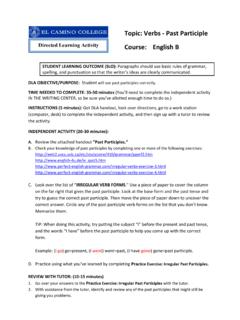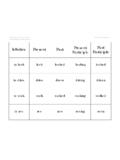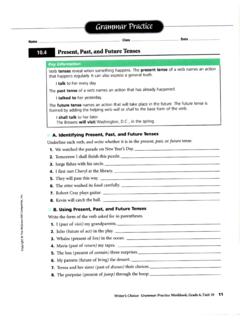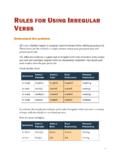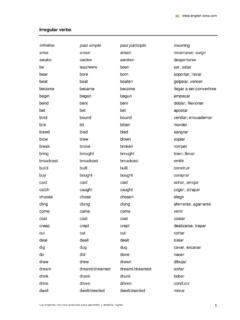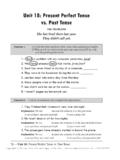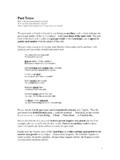Past past participle
Found 10 free book(s)Topic: Verbs - Past Participle
www.elcamino.eduPAST PARTICIPLES MAIN VERB FORMS Present: I ask a classmate for directions to the Writing Center. Past: Yesterday I asked my instructor about the assignment. Past Participle: I had asked my study partner to meet me in the library, but he didn’t show up. Present Participle: I was asking where to get a parking permit when I witnessed an accident. PRESENT PAST PAST PARTICIPLE
englisch-hilfen.de – LEARNING ENGLISH ONLINE infinitive ...
www.englisch-hilfen.deenglisch-hilfen.de – LEARNING ENGLISH ONLINE englisch-hilfen.de – LEARNING ENGLISH ONLINE Irregular verbs - difficult - page 1 infinitive simple past past participle
Infinitive Past Participle - Montessori for Everyone
www.montessoriforeveryone.comInfinitive Present Past Present Participle Past Participle to be am is are was were being been to wear wear worn wearing worn to teach teach
Present, Past, and Future Tenses - Syracuse, NY
www.syracusecityschools.comName Class Date Present and Past Progressive Forms i i I e I 5 The present progressive form of a verb tells about an action that is continuing now. It consists of the present participle and the helping verb am, is, or are. The students are talking to one another The past progressive form of a verb names an action that continued for some time in the past.
Rules for Using Irregular Verbs
www.chompchomp.com1 RULES FOR USING IRREGULAR VERBS Understand the problem. All verbs, whether regular or irregular, have five forms [often called principal parts]. These forms are the infinitive, simple present, simple past, past participle, and present participle. The difference between a regular and an irregular verb is the formation of the simple
Lista Irregular verbs - english-area.com
www.english-area.comwww.english-area.com Los mejores recursos gratuitos para aprender y enseñar inglés 1 Irregular verbs infinitive past simple past participle meaning
Unit 18: Present Perfect Tense vs. Past Tense
www.prolinguaassociates.comUnit 18: Present Perfect Tense vs. Past Tense • 81. Exercise 8: Write the sentences that your teacher reads. Use the words in the box. The number with each word is the sentence number that the word is in.
sExercExerciisee 2288 - English for Everyone
englishforeveryone.orgRR eaaddThheoorryy..OOrrgg © 2 01 E n glishFF o rEv ey .O © 22000088 Name_____ Date_____ sExercExerciisee 2288 Past Tense Fill in the spaces with the correct form ...
Past perfect tense - English for Everyone
englishforeveryone.orgnow A time in the past An earlier time in the past 2) It is cold. Directions: Now make your own sentences in the past perfect simple tense. 1) _____ 2) _____ The past perfect (progressive) tense is used to describe an action that was happening
Past Tense - David's Homepage
cokdybysme.net3 The Czech past tense combines with verbal aspect to indicate an activity or process in the past (via the imperfective aspect) or a completed event (perfective aspect). Note the contrasts in meaning: Dlouho jsem psala esej, ale ještě jsem ho nenapsala. I was writing the essay for a long time, but I haven’t finished writing it yet. psát = imperfective napsat = perfective
Similar queries
Topic: Verbs - Past Participle, Past, Past participle, Participle, Past past participle, Difficult, Infinitive Past Participle, Participle Past Participle, Present, Past, and Future Tenses, Irregular verbs, Past, past participle, Unit 18: Present Perfect Tense vs. Past, SExercExerciisee 2288, English for Everyone, SExercExerciisee 2288 Past, Past perfect tense, Past tense
